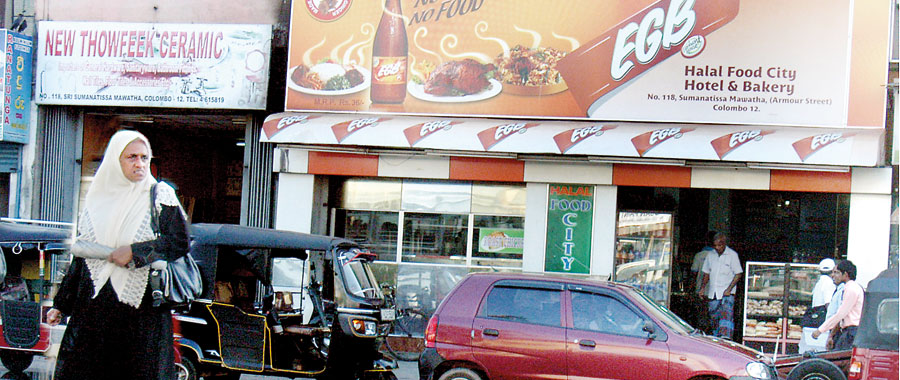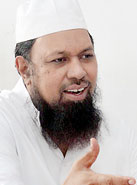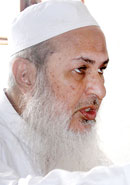News
Sinhala Muslim amity intact, small group creating tension over Halal: ACJU chief
View(s):By Anthony David
As controversy grows over the issue of Halal certification by the All Ceylon Jamiyyathul Ulama (ACJU), a Cabinet Sub Committee is trying to work out a solution to the crisis. Against this backdrop, the Sunday Times spoke to ACJU President As-Sheikh M.I.M. Rizwe (Mufthi), and Halal expert Tariq Mahmud to get their views on various allegations regarding the Halal issue.
Excerpts from the interview:
What are the goals and the vision of the ACJU? When was it formed?
The ACJU was started in 1924. It is a body set up for Sri Lanka and not based on any foreign model.. Our objective is to promote cultural, social and economic welfare of the Muslims in accordance with Islam.

A shop hoarding bearing the assurance that it serves ‘halal’ products. Pic by Nilan Maligaspe
We provide social service, educational service and give Shariah advice to Muslims when they contact us. For instance, they contact us to know about Islam’s stance on marriage and divorce. The ACJU has a Halal division which is involved in issuing Halal certification.
How do you see the strong reaction in recent months by a vociferous section of the majority community to the Halal certification and other issues relating to the Muslims?
We do not believe that the majority of the Sinhala people support this campaign against the Muslims. We have co-existed in harmony for more than 1,000 years.
But, despite such relationship why do you think the protests have increased now?
We have good ties with the majority Buddhist community. We do not have any doubt about them. But there is a small group with some kind of misunderstanding about Islam and our activities. Also there are foreign interests. These issues have come up suddenly.
The issue of Halal certification has become the subject of heated controversy. Your reactions?
We have issued Halal certificates to 220 companies. There has been no issue with these companies and we believe the protests are based on a misunderstanding.
Can you explain why you issue these certificates?
For the Muslims everything has to be Halal. Basically, the things they can do are known as Halal and the things they can’t do are known as ‘Haram’. Food has to be Halal. Even our income and our dress need to be Halal. For instance men cannot wear silk and gold, but for women they are Halal. Any Muslim will understand the terms Halal’ and Haram. Halal covers trade, culture and other areas.
What are the rates levied for Halal certification?
They range from Rs. 750 a month to a maximum of Rs 25,000 a month. If it is more than five products and less than 10 it comes to about Rs. 1,500 a month. It will not be more than 25,000 even if there are 300 products. We charge a minimal fee because the funds are required for the work of the Halal division.
Why is the ACJU involved in issuing this certification?
All over the world even in Singapore and Thailand the body that issue the certification is made up of Muslim scholars. The ACJU functions in a similar manner.
What is the process you follow?
There is a technical side and a Sharia side in issuing the Halal certification. For instance, an ingredient used in bread in Sri Lanka was stopped because L-Cystenine derived from the pig was being used. We got it stopped.
But why is there more emphasis now on the issuing of Halal certification?
Earlier most food items were simple; ingredients were direct and there was no sophistication in the food. When imported items came in, the situation changed. Earlier the knowledge about tests was minimal. Later producers printed list of ingredients used. People used to decide depending on the ingredients. With the knowledge coming in, awareness has increased. Therefore the Muslims are more concerned.
Are there any cases of the illegal use of the term ‘Halal’?
 ACJU President As-Sheikh M.I.M. Rizwe (Mufthi). Pix by Indika Handuwala |
 Halal expert Tariq Mahmud |
Yes there are abuses. For instance, when you ask some traders they say the food is fresh, but that is not the real meaning of it. For instance poultry products are also used from sub-contractors and packed under their name. Some used to get certificates from mosques and claim they are Halal.
So, it is not foolproof?
Yes.
When did the issuing Halal certification start in Sri Lanka?
In 2000. Earlier a group known as Halal Food Awareness Campaign issued certificates. But that was stopped.
Where does the money received for the certification go to?
The money is to pay for the staff involved in Halal certification. There is no profit.
Does your membership or board of management go around checking food items and inviting manufacturers to apply for Halal certification? What are the criteria used?
In each abattoir there is a monitor employed by ACJU. He is paid a salary from the money received by the ACJU. There is also a team of auditors who visit all the certified facilities, abattoirs and restaurants on a monthly basis to audit the facility for Halal confirmation.
For what purpose do you issue Halal certificates?
The main purpose is to make the Muslims aware of what food is Halal.
If as you say, Islam demands that certain laws be adhered to, don’t you think the issue of such certificates should be a service and not with a fee?
There is cost involved in it and we are not making profits. Some charge that we are making as much as Rs 800 million a year. We have a staff of more than 50 and we need to pay their salaries.
How do you respond to the criticism that though Muslims are only about 9 per cent of the country’s population, you are seeking to issue certificates to all. What is the rationale?
Our target was only to issue this to the Muslims. Of course this system benefits the persons selling these products. Also whenever Muslim tourists come they look for Halal food. We have not forced anyone to get the Halal certificate.
If you are enforcing a requirement under the Islamic law, don’t you think the issue of such certificates could be carried out by a state agency, like the Muslim Affairs Department or by the Standards Institution? Why then has the ACJU stepped in? Is it because there are charges you are trying to raise money?
Blood and urine test reports are provided by labs. Therefore private organisations issue certificates. In this case the authority should be an Islamic authority. If the SLSI issues a certificate it will look at hygiene standards. The SLSI may even issue a certificate for pork if it meets certain standards. The Halal aspect cannot be ensured by the SLSI. We are not opposed to any state agency issuing such certificate, but it should be done in keeping with Islamic teachings. Our aim is not to raise funds.
There are reports that ACJU theologians are assigned to preach at Jumma prayers on Fridays. It is said that the ACJU sets the agenda on what these preachers should say. Recently President Rajapaksa had occasion to caution some of your members after statements were made that Muslims should defend themselves? Is this not a provocative reaction?
We only give a theological guideline on what to preach. We do not see that as a provocation.
Since you are collecting funds from the public i.e. private sector business houses, don’t you think that your income should be subject to public audit by a state authority? Do you pay tax on the revenue generated?
We are a private organisation and get our accounts audited and pay taxes accordingly. Our accounts are audited by a private firm. But if necessary we are ready to submit our accounts to any state agency.
What is the ACJU’s view on the new practice of Muslim women wearing hijab? Does this help them to mingle in society? From where did this new practice come? Upto the 1970s or 80s this phenomenon was not there. How do you explain its presence now?
Several cultural changes have taken place. Earlier the Muslim women seldom or never came out. They travelled with curtains in their vehicles. That was our culture. Earlier university education was almost prohibited. Now more women come out in society. The Shariah law is that a Muslim woman should keep her face and hands only open or be fully covered. There is no second opinion on that.
In France for example, the wearing of head scarves is banned. What is your view? How would you enable Muslim girls and women to interact with people of other communities?
France is one of the countries that speak about freedom of expression. The Muslim dress code for women is meant to ensure they do not cause moral problems in society and to ensure their safety.
How do you respond to charges regarding the mushrooming Madrasas (seminaries), foreign funding and the different sects Wahabis and other Sunni groups clashing in Sri Lanka amid growing fundamentalism?
There are four schools of thought regarding Shariah and we try to keep them together. In every religion, there are factions. The Madrasas are for religious guidance – they are like schools where religion is taught.
But, there are fears about foreign funding for these schools.
Muslims like to do charity. When they come they donate funds. Not that everyone who comes funds such schools. If the funds are coming in a wrong manner, investigations could be carried out.
There are allegations that the ACJU has political motives and wants to be on the side of the Government. Is this why you were in Geneva last year during the UNHRC sessions?
Our executive committee decided on this. When the nation is under threat, the Muslim community also should come forward. That is the reason we sent a delegation . We did not take Halal issue to Saudi Arabia.
Follow @timesonlinelk
comments powered by Disqus
















